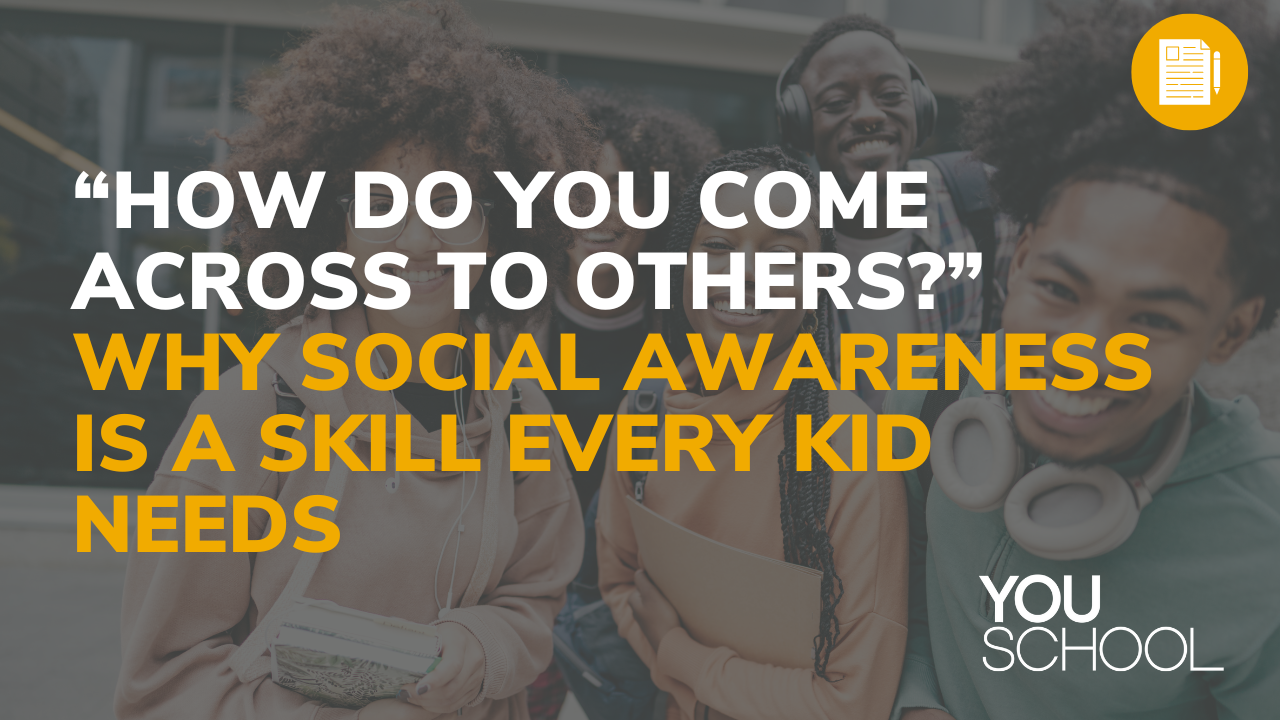“How Do You Come Across to Others?” Why Social Awareness Is a Skill Every Kid Needs

What Is Social Awareness?
Social awareness is the ability to read the room, understand other people’s feelings and perspectives, and recognize how your own words, tone, and behavior affect others.
Psychologist Daniel Goleman, who popularized the idea of emotional intelligence, defines it as one of the core competencies of a healthy, effective person. And Howard Gardner, in his work on multiple intelligences, describes interpersonal intelligence as the ability to notice others’ moods, motivations, and intentions—and respond appropriately.
In plain terms?
It’s about knowing how you show up.
But here’s the thing: social awareness isn’t something most kids are naturally good at. And in today’s fast-paced, screen-dominated world, they’re getting fewer opportunities to practice.
Why It Matters
When a kid lacks social awareness, it can impact every part of their life.
They might:
-
Interrupt without realizing it
-
Miss facial expressions or tone
-
Come across as rude, awkward, or uninterested
-
Dominate conversations without knowing it
-
Feel misunderstood or left out
And over time, this can lead to loneliness, low confidence, and damaged relationships.
The problem isn’t that they’re bad kids. It’s that they don’t have the skills yet. And those skills can be taught.
Why It’s Harder for Some
It’s also important to acknowledge that some kids will find social awareness harder to develop—especially those who are neurodivergent.
Kids with ADHD, autism, anxiety, or other processing differences might struggle to notice or interpret subtle social cues. They might be deeply empathetic but not know how to show it. Or they may feel overwhelmed in social situations and shut down.
For these kids, what comes easily to others—reading a room, adjusting tone, noticing discomfort—might take extra time, practice, and support.
And the worst thing we can do? Shame them for it.
Instead, they need patient, explicit coaching and lots of practice in safe environments.
What Happens When Kids Do Learn It?
When a kid begins to develop social awareness, everything changes.
They start to:
-
Pick up on nonverbal cues
-
Adjust their communication based on the situation
-
Ask thoughtful questions
-
Listen more than they speak
-
Repair relationships when things go sideways
They’re not shape-shifting or faking it.
They’re becoming more intentional—and more empathetic.
These kids are more likely to build strong friendships, lead well, collaborate in teams, and form meaningful connections. And they grow up into adults who are trusted, respected, and emotionally intelligent.
How Parents Can Help
You can help your kid build social awareness in simple, everyday ways:
1. Ask reflective questions.
After a social moment, try:
“How do you think that came across?”
“What do you think they were feeling?”
“If you could do that again, would you change anything?”
2. Gently name the impact.
Instead of saying, “You were rude,” try:
“I noticed when you said that, your friend got really quiet. What do you think that meant?”
3. Model it yourself.
Talk about your own interactions:
“I think I came off too stressed in that meeting—I need to check in with them.”
4. Role-play together.
Practice how to enter a group, listen well, ask follow-up questions, or handle a disagreement kindly.
None of this needs to be intense. You’re not giving them a performance script—you’re helping them be more tuned in.
What’s at Stake
Here’s the truth:
If your kid doesn’t learn this skill, they’ll likely struggle to build and maintain strong relationships. They may feel chronically misunderstood or isolated. They may develop a habit of people-pleasing, over-explaining, or withdrawing altogether.
But if they do learn it?
They’ll thrive—in friendships, family, school, and eventually, their future workplaces and communities.
They’ll know how to navigate hard conversations. How to lead with empathy. How to connect with people meaningfully.
And all of that starts with one small but powerful question:
“How do you come across to others?”
Ask your kid this week.
Then listen. Talk. Reflect together.
Because this one skill?
It could shape every relationship they have.
